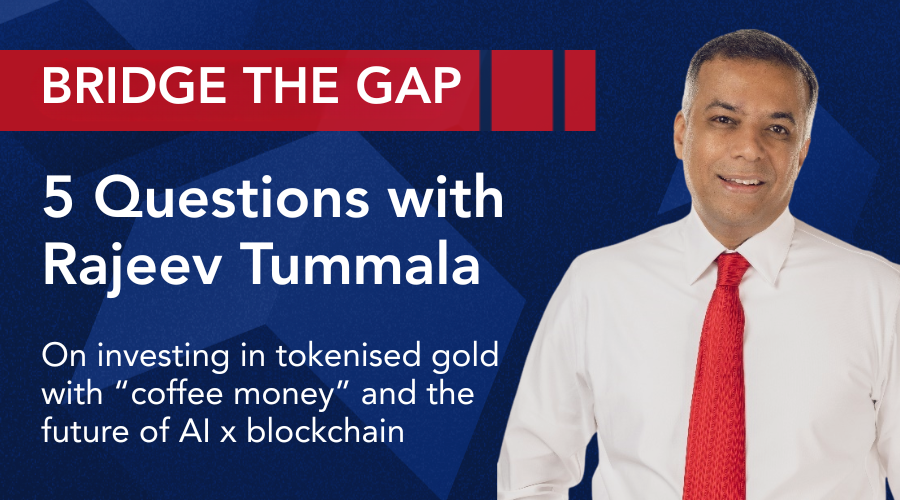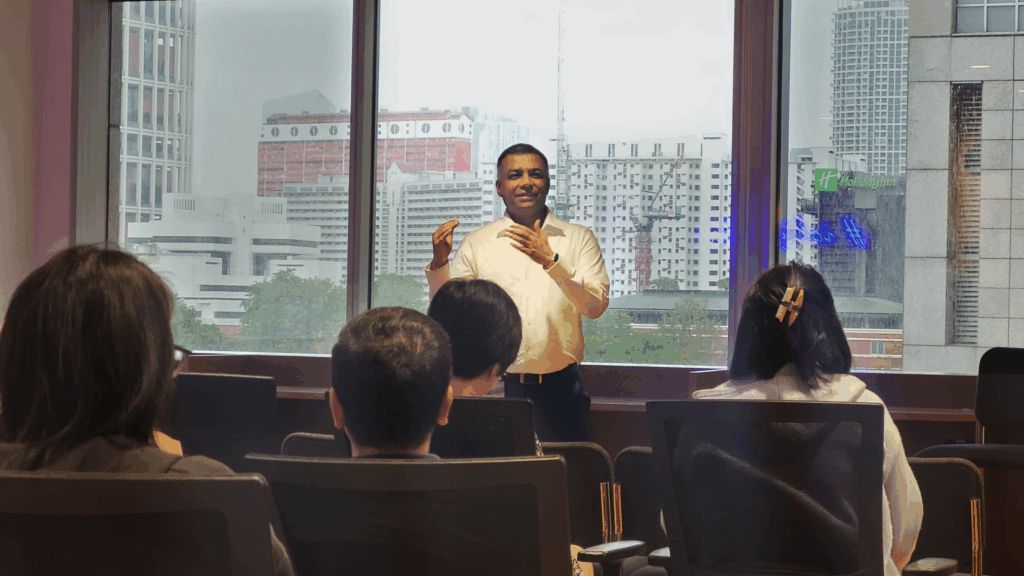5 Questions with Rajeev Tummala, Head of Digital & Data (Asia & MENA), HSBC Securities Services

SBIDM speaks with Rajeev Tummala, Head of Digital & Data (Asia & MENA), HSBC Securities Services as he shares more on the possibility of investing in as little as 0.001 troy ounce of tokenised gold with “coffee money” and the future of integrating AI x Blockchain.
1. We’ve seen HSBC deploy a variety of Digital Ledger Technologies (DLT) in the past few years, from Digital Vault to Orion. What encouraged HSBC to explore blockchain and digital assets?
From pilot to platform: building trusted rails for programmable finance.
HSBC’s exploration of DLT was not driven by hype, but by client need. Our custody and post-trade businesses sit at the heart of the financial system yet much of that infrastructure was built for an analogue age. Reconciliations, settlement delays, and fragmented data flows create cost and risk. Distributed Ledgers provides an opportunity to replace silos with a single source of truth, enabling assets to be “born digital” and serviced more efficiently.
These initiatives are integral to HSBC’s exploration of DLT:
- We began with Digital Vault in 2019, digitising private placement records for institutional clients.
- The next step was the issuance pilots that HSBC ran with SGX, Temasek totaling around S$3B digital bonds in 2020, proving end-to-end issuance could be executed securely on DLT.
- Those lessons informed the launch of HSBC Orion, now live in Luxembourg and Hong Kong, which has already supported multiple digital bond issuances.
For us, the journey is about moving from isolated pilots to regulated platforms that integrate seamlessly into global markets.

2. AI x Blockchain – two often-used buzzwords in fintech. Can you share more on how you see the deployment of both technologies transforming the financial services ecosystem?
AI is the brain, blockchain is the spine.
Artificial Intelligence (AI) and blockchain complement one another. AI enables learning, prediction, and personalisation; Distributed Ledgers provide trust, provenance, and programmability. Together, they enable workflows where digital agents can act with confidence in data, identity, and settlement.
Imagine an AI-powered portfolio engine that can not only advise clients but also execute trades on tokenised assets through smart contracts, with every step verifiable on-chain. Corporate treasuries use AI to optimise yield & liquidity, while blockchain ensures funds move atomically across currencies.
At HSBC, we are contributing to Project Guardian in Singapore and similar initiatives in Hong Kong because these environments allow us to test how AI and DLT can work safely at scale. The opportunity is to build agentic, programmable financial markets where efficiency, transparency, and compliance are designed from the start.
3. Investing in tokenised gold with coffee money – can you tell us more about HSBC’s tokenised gold offering for retail investors and how it compares with other offerings in the market?
Fractional gold, institutional trust.
In 2024, we introduced the HSBC Gold Token in Hong Kong. For the first time, retail investors could buy gold in increments as small as 0.001 troy ounce – literally, with “coffee money.” Each token represents physical gold securely stored in HSBC’s vaults, with holdings recorded on a private, permissioned blockchain. Access is simple: clients can transact through HSBC Online Banking and the HSBC HK app.
The differentiator lies in trust and integration. Unlike unregulated products, the HSBC Gold Token sits within our regulated banking perimeter, subject to the same standards of KYC, AML, and investor protection as traditional offerings. It is also integrated with Orion, which means the same backbone that supports institutional-grade tokenised bonds powers this retail proposition.
This combination of fractionalisation, regulated issuance, and bank-grade safe keeping brings institutional-level confidence to mass-market investors. We believe it is a model for how tokenisation can democratise access to traditionally exclusive asset classes.
4. HSBC has tokenised structured products and funds in Singapore and Hong Kong. What are the biggest takeaways from these launches?
From term sheet to smart contract: the law is as important as the ledger.
When HSBC tokenised structured products and funds in Singapore and Hong Kong, the biggest lesson was that technology is only half the challenge. Designing legal frameworks, codifying product lifecycles, and ensuring interoperability across custodians, distributors, and regulators proved just as important.
We learned that embedding tokenised products into existing client channels and wallets drives adoption faster than standalone digital experiences. We also saw that cross-border consistency is critical: standards emerging from Project Guardian such as the Funds Framework are invaluable in ensuring scalability. Finally, safe settlement money is a missing link: tokenised deposits, CBDCs, and stablecoins will be essential to unlock true atomic DvP and PvP.
These learnings are not just theoretical. They are already informing how we design the next generation of wealth products – programmable, compliant, and interoperable by design.
5. Having worked with regulators in Singapore and Hong Kong, can you share more on the objectives for HSBC in participating in Project Guardian and Project Ensemble? Do you see any potential for collaboration between HSBC and other fintech partners?
Industry sandboxes are the wind tunnels of finance.
For HSBC, Project Guardian is about proving that tokenised wealth and fund products can work safely, legally, and at scale. Our contributions such as a legal playbook for issuers and an asset framework for tokenised funds help translate proof-of-concepts into market-ready standards.
In Project Ensemble, we are working with regulators and peers on tokenised deposits, digital money forms , and deposits as settlement assets. This is critical because tokenised securities cannot reach their potential without tokenised cash to settle against.
Both initiatives illustrate how collaboration with regulators and fintech partners can accelerate progress. Fintechs often bring specialised capabilities in wallets, smart-contract assurance, or privacy-preserving computer while banks provide scale, governance, and client trust. Together, we can test, learn, and ultimately commercialise the programmable financial infrastructure of the future.
